In sport and exercise science, the timing of exercise remains a controversial topic. As new research (Arciero et al, 2022) suggests, some investigators favour morning exercise to enhance muscle adaptations and fuel utilization whereas, others have shown afternoon/evening exercise is most favorable to improve muscle function.
As a sport and exercise lecturer for years, I’ve always been interested in this research, because I know myself, that there are favourable times of the day, that I feel better doing my exercise. Early morning is one of these times, and I know that from a stress and blood pressure management perspective, pulling on my walking shoes and/or cycling, is a great start to my day.
So, when I saw new research about the differences time of day of exercise according to gender, and that some of the women were either peri-menopausal (still menstruating) or post-menopausal (not menstruating), I couldn’t help but share it with you – especially those of you who want to manage your weight.
The researchers concluded that yes indeed, there are differences in how men and women respond to various forms of exercise training depending on the time of day. And when it comes to managing your weight and your blood pressure, then the time of day may matter.
In this particular sports science research published in the Frontiers of Physiology paper, it was morning exercise (AM) that reduced abdominal fat and blood pressure compared with evening exercise (PM) which enhanced muscular performance in women.
This result differed from the men. It was evening exercise that had the highest effect on reducing systolic blood pressure and fatigue.
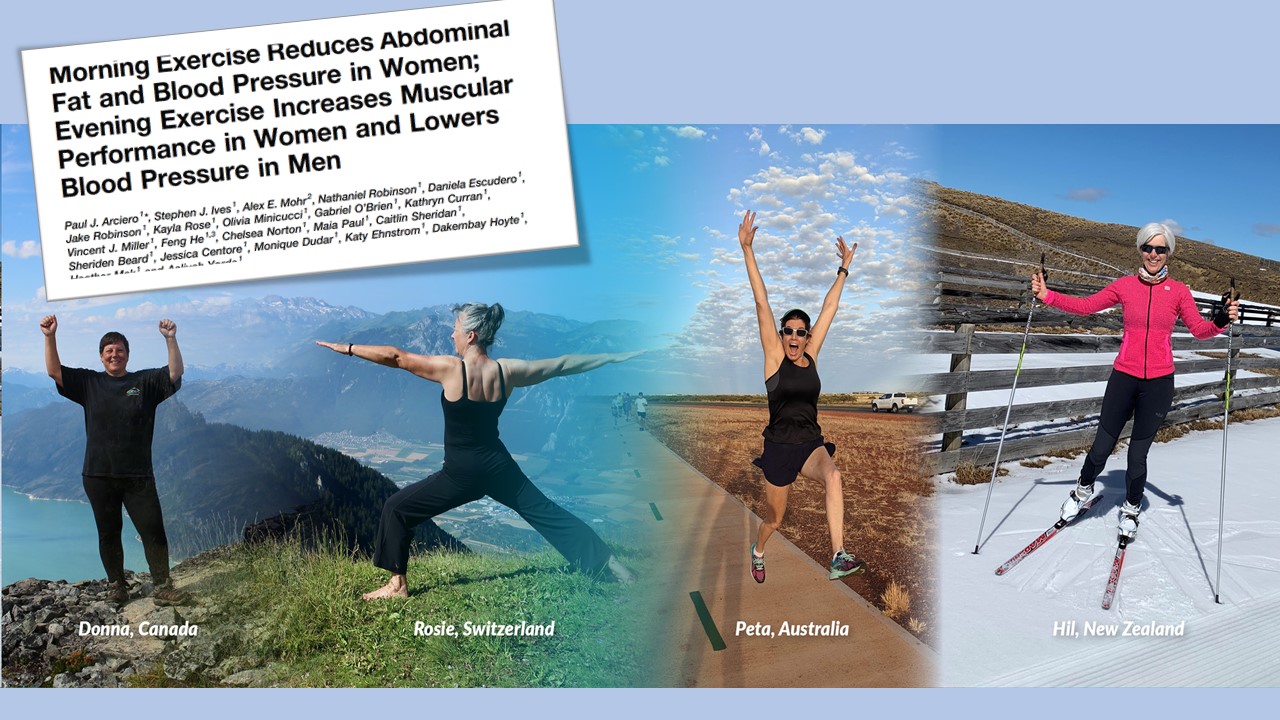
Why Morning Exercise for Women’s Weight Loss is an Important Consideration during Menopause:
For over 30 years, Professors Rena Wing and James Hill have been over-seeing the National Weight Control Registry [NWCR] at Brown University in America. For nearly 20 years, I’ve been following their research and teaching students from it.
These days I’m no longer teaching students, but bringing the fabulous research from the NWCR to the attention of mid-life women on my weight loss programme called Transform Me.
The intent and purpose of the Registry researchers, led by Professor Wing, has always been to explore the factors that contribute to successful or unsuccessful weight loss as well as it’s maintenance into the long-term.
With the Registry having been set up in 1994, when many of us were in our 20’s, they have now tracked thousands of men and women, categorising them into ‘Successful’ versus ‘Unsuccessful’ weight loss individuals. It is the largest prospective investigation of long-term successful weight loss maintenance.
These studies and others have informed the advice I give women on the MyMT™ Transform Me weight loss programme and how, when I was presenting at the World Health Organisation conference on Healthy Ageing back in 2016, I met Professor Wing.
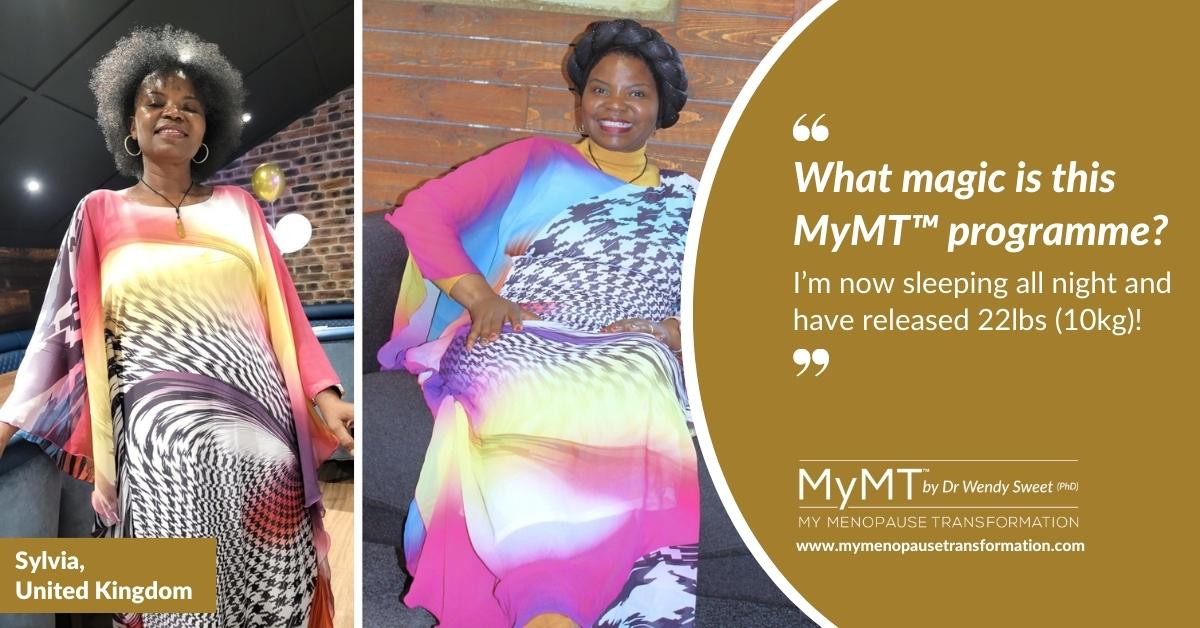
She had just set up a new outreach weight loss programme for middle-aged women – many of whom were overweight, had Type 2 Diabetes and experiencing cardiovascular health changes.
At the time, within the fitness and dieting industries, there was a lot of emphasis on high protein and high-fat Keto diets as well as high-intensity exercise, including heavy strength training for weight management, but as many women know, this becomes difficult to maintain motivation to do, when we aren’t sleeping or when our joints are sore.
I was fascinated with the research she had undertaken on ‘successful’ weight loss participants, because it was completely the opposite to what I had learned in sport and exercise science research, which of course, has mainly been undertaken on male athletes in the past.
As Arciero and authors mention (2022), in their paper on daytime differences in exercise for weight loss and blood pressure, relative to men, women still remain generally under-studied in exercise science and sports medicine research with only ~36% of study populations being women , if they are included at all. Some estimates suggest inclusion of women in sports science research to be as low as 3% (Brookshire, 2016).
That’s why, the day that I began to question what I was doing to manage my own weight gain during menopause, was the day I listened to Professor Wing’s research. My weight was increasing, no matter what I did as numerous women discover as they arrive in midlife. I was no exception.
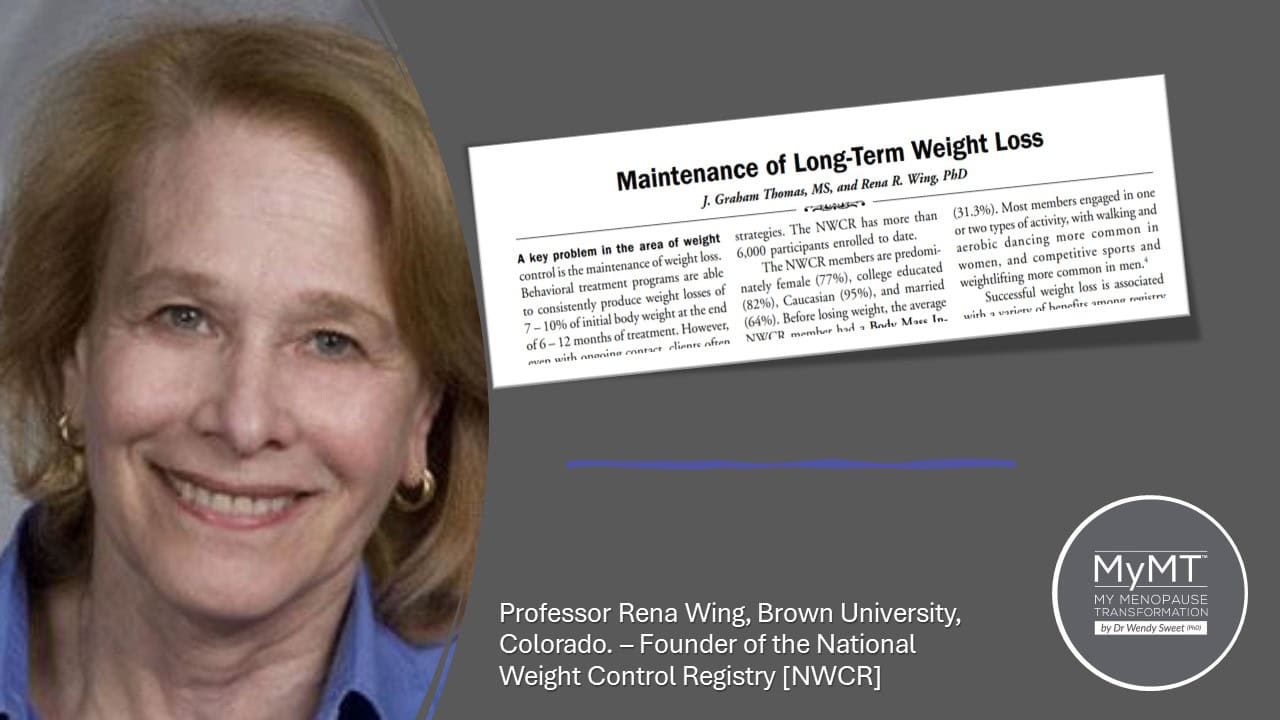
As I listened to Professor Wing back in 2016 in Australia, I understood that much of the information about weight loss, exercise and dieting, was informed by exercise and sports science and sports nutrition research and not for women’s changing health as they moved through menopause. Especially, when it came to understanding how and when to exercise to reduce blood pressure and improve body-fat levels.
That’s why, due to the fabulous work of Professor Wing and her team, I have incorporated some of her work into the MyMT™ programme too. The NWCR research findings are important to all of us in mid-life – simply because 80% of the participants are women in their mid-40’s and early 50s who have lost weight and kept it off for over a year.
Whilst studies have been reported from the Registry for the past two decades, one of the more recent findings from the NWCR studies, was about long-term maintenance of weight loss and the concept of ‘morning-ness‘.
This is the term given to people who are ‘morning people’ and comes from studies on sleep and chrono-type, i.e. whether someone is a ‘morning’ or an ‘evening’ person.
Overweight and Obesity status has been associated with both shorter sleep duration and poor sleep quality, because the amount of sleep we get influences our two main gut hormones – leptin and ghrelin.
Shorter sleep duration has been shown to lead to decreased levels of leptin, which is a protein that tells our brain that we are full. When levels of leptin are decreased, then this may cause over-eating and uncontrolled appetite, because leptin helps to manage satiety (fullness).
It is well known that women transitioning menopause don’t sleep well. I’ve talked about this often in my articles and how lack of sleep can contribute to both high blood pressure and changing gut health. It’s because of this link with leptin levels, that I always say that you can’t lose weight if you aren’t sleeping. Your gut hormones and your cardiovascular health, may be against you.
If you are a morning person however, then this runs in your favour when it comes to successful weight loss – ‘successful’ is deemed as a year or more sustaining your weight loss by Professor Wing and her NWCR team.
Findings from the NWCR has provided valuable insight in the characteristics and behaviours of highly successful weight loss participants (13kgs or more) and how they have kept it off. Individuals report continued consumption of a reduced calorie, low fat diet, regular engagement in physical activity (primarily walking in the mornings) and frequent self-weighing.
But there’s another factor as well.
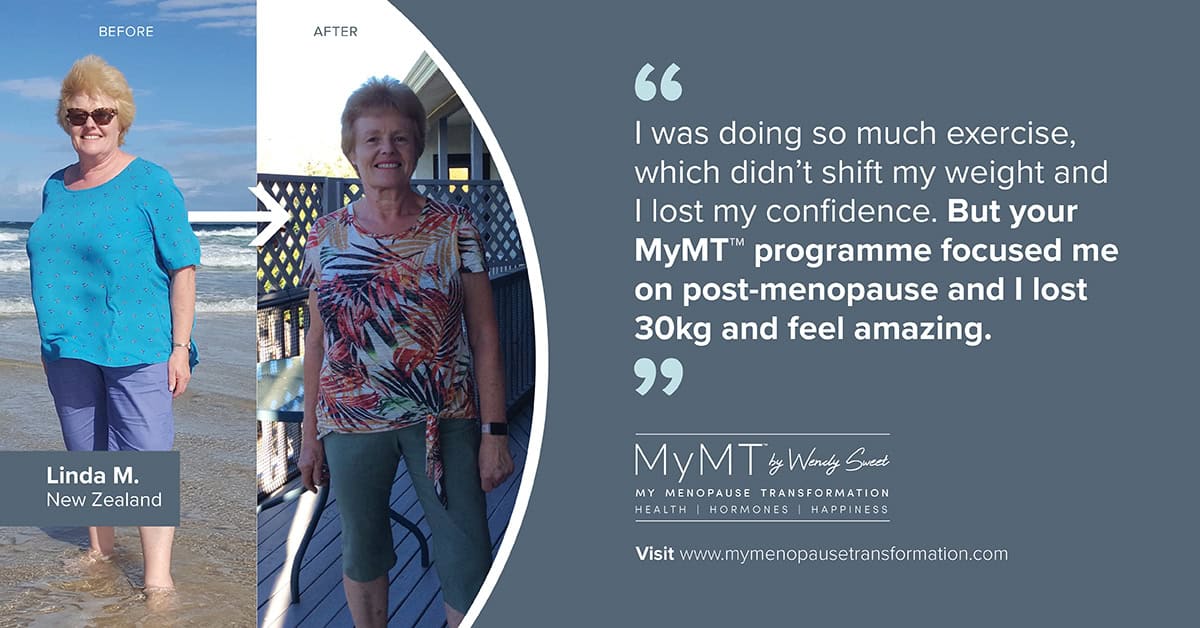
Most of the highly successful long-term weight loss participants (all middle-aged) were ‘morning’ people who also enjoy a longer sleep duration than those who did not keep the weight off long term.
“Results demonstrated that individuals who have been highly successful at both weight loss and long-term maintenance were more likely to be categorised as ‘morning-type’ chronotype and reported longer sleep duration and better sleep quality” mentioned the study (Ross, Thomas & Wing, 2016).
Improving sleep quality and setting a new routine for the morning is one of the hallmarks of the MyMT™ programme. This is hard for women who feel stressed, burnt-out and exhausted and who also have a busy morning routine already.
I often talk about this within the context of stress management in the workplace and why, I believe that the focus on ‘only HRT’ and workplace legislation changes, don’t take into account, that for many midlife women, having flexible working hours is crucial.
Not only in terms of stress management, but because morning exercise is known to have positive impact on their sleep, blood pressure and cortisol levels – all pre-requisites for also turning around their temperature dysregulation and brain-fog.
Sleep research consistently shows that to improve sleep quality and quantity, then our morning routine matters.
This is why, for weight loss, the first module women listen to in the powerful evidence-based MyMT™ programmes, is about sleep quality and starting the day with natural light in our eyes to switch off our sleep hormone melatonin, helping to re-set the day-night circadian rhythm.
Not only is this important for weight loss, but it’s also important for our changing cardiovascular health as we age.
Menopause changes can upset your body’s unique bio-chemistry and yes, it also is advised to go to your Doctor to discuss your symptoms as well. However, I also want you to know that lifestyle change is important in order to allow your body to adapt to its ‘new normal.’
This is what MyMT™ delivers to you – all the scientifically evidenced step-by-step strategies which you access over 12 weeks, so you discover how to work with your changing hormones in menopause, not against them. I hope you can join me sometime. Alternatively, start with my Masterclass on Menopause webinar, which has powerful lifestyle solutions for you to consider too.
Dr Wendy Sweet [PhD]/ Member: Australasian Society of Lifestyle Medicine
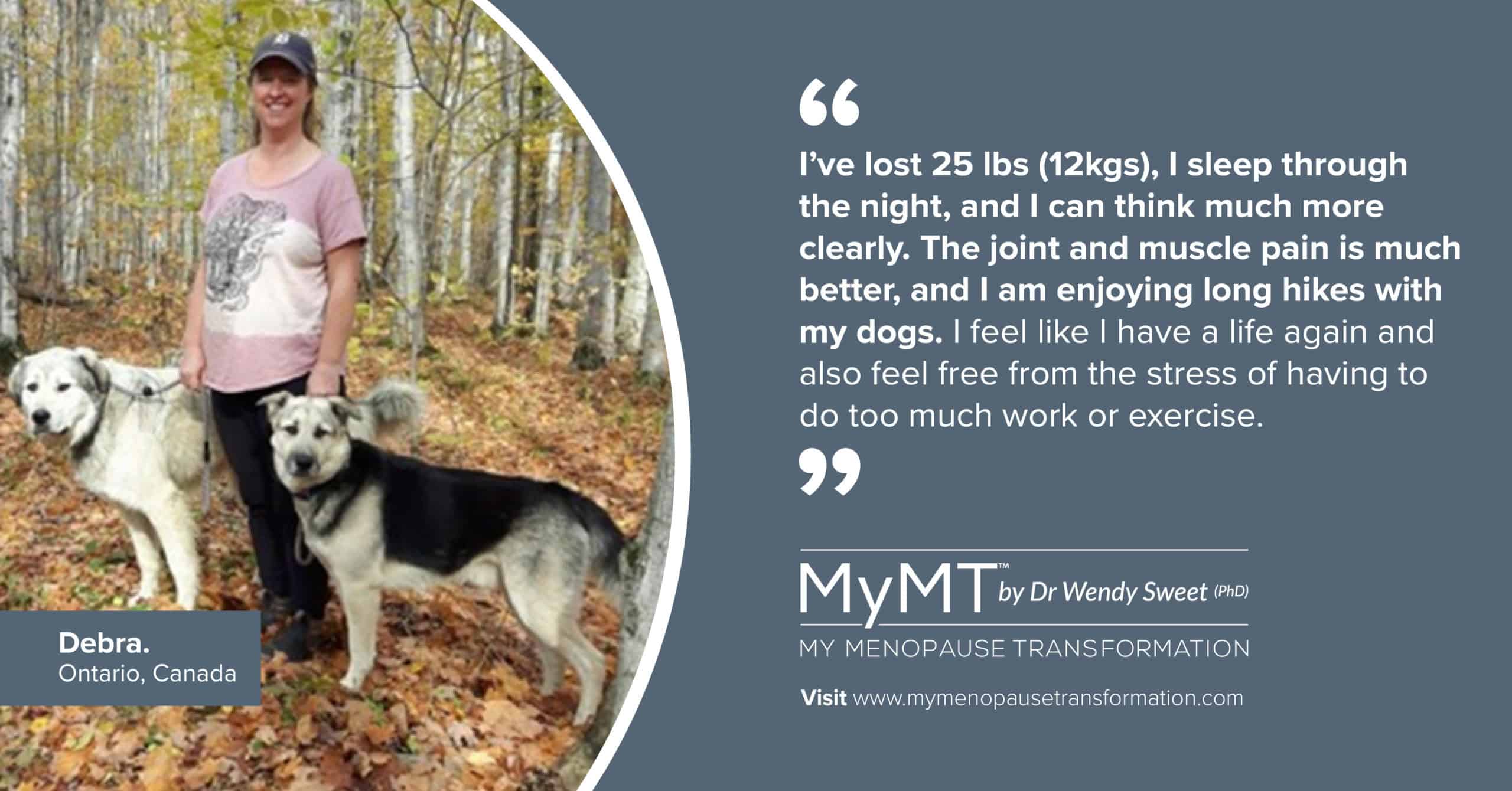
References:
Arciero PJ, Ives SJ, Mohr AE, Robinson N, Escudero D, Robinson J, Rose K, Minicucci O, O’Brien G, Curran K, Miller VJ, He F, Norton C, Paul M, Sheridan C, Beard S, Centore J, Dudar M, Ehnstrom K, Hoyte D, Mak H, Yarde A. Morning Exercise Reduces Abdominal Fat and Blood Pressure in Women; Evening Exercise Increases Muscular Performance in Women and Lowers Blood Pressure in Men. Front Physiol. 2022 May 31;13:893783. doi: 10.3389/fphys.2022.893783.
Brookshire B. (2016). Women in Sports Are Often Underrepresented in Science: Studies of Competitive Sports and Exercise Are Still Dominated by Men. Sci. News.
Hill, J., Wyatt H., Phelan S., Wing R. (2005). The National Weight Control Registry: is it useful in helping deal with our obesity epidemic? J. Nutr Educ Behav. Jul-Aug; 37(4):206-10.
Ross, K. M., Graham Thomas, J., & Wing, R. R. (2016). Successful weight loss maintenance associated with morning chronotype and better sleep quality. Journal of Behavioral Medicine, 39(3), 465–471.

